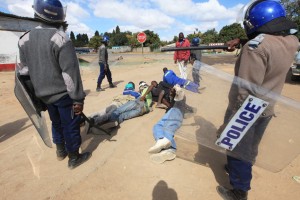 In recent months, the imploding economy and a brutal crackdown on civil liberties have triggered a wave of demonstrations as Zimbabweans bear the brunt of high unemployment and a biting cash crisis.
In recent months, the imploding economy and a brutal crackdown on civil liberties have triggered a wave of demonstrations as Zimbabweans bear the brunt of high unemployment and a biting cash crisis.
Government has reacted to protests by unleashing the repressive state apparatus to pulverise demonstrators who, in a few cases, have also turned violent. Mugabe has sparked outrage by criticising the judiciary for handing down judgements allowing peaceful demonstrations.
Riots first broke at Beitbridge Border Post on July 1 with police failing to combat the demonstrators. In the aftermath, all the police officers were transferred after the Police Internal Security Intelligence at the border town complained the police officers had ignored their early warning calls on the riots.
Sources said security, police and intelligence services have embarked on a crackdown on dissent, targeting leaders of social movements such as #Tajamuka. The leaders have also been targeted at nightclubs and in their homes.
“Quick reaction units of Harare-based units are on standby. The state now knows what social media can do to destabilise the regime so they have come up with several measures to contain this. At this stage there haven’t been reports of extra-judicial killings but torture and intimidation of social movement leaders,†a source said.
“For as long as the protestors do not provoke security forces, soldiers won’t use any live ammunition on civilians who are protesting.â€
On Tuesday this week, Judge President George Chiweshe dismissed two urgent chamber applications seeking to set aside a proclamation by the Zimbabwe Republic Police to ban marches and demonstrations in Harare’s central business district.
In August, government also directed mobile phone operators to suspend any promotions on mobile phone data amid concerns that social media platforms were facilitating the dissemination of subversive information.
Last month, the Zimbabwe Independent reported that government had covertly deployed the military and other security forces to surround the protests-wrecked capital Harare, while unleashing a crack unit to operate under cover to crackdown on the opposition and civil society groups stepping up pressure for Mugabe to reform or quit.
A few weeks later #Tajamuka spokesperson Silvanos Mudzova was abducted from his home by six unidentified man before being assaulted and left for dead.
Later the same month, National Vendors’ Union of Zimbabwe (NAVUZ) Harare chairman Kudakwashe Kambakunje was also allegedly abducted and flogged by state security agents for organising protests in Harare.
This came after Mugabe threatened to quell the current wave of demonstrations and riots rocking the country’s structure-induced stability, saying: “They are thinking that what happened in the Arab Spring is going to happen in this country, but we tell them that it is not going to happen here.â€
The Arab Spring was a series of anti-government protests, uprisings and armed rebellions that spread across the Middle East in early 2011
The Zimbabwe Independent reported that nine lieutenant-colonels and 65 majors from the Zimbabwe National Army (ZNA) and other senior Zimbabwe Defence Forces officers have been deployed under the cover of command agriculture, with some manoeuvring into strategic positions around Harare — behind the scenes — to position themselves to swiftly move and quash any revolt as political discontent and social unrest grow.
Senior military officers have been indispensable in maintaining Mugabe and Zanu PF in power.
Therefore, the deployment of the army is seen as the last resort after police have been struggling to contain the spreading protests, from the Beitbridge riots in July to Harare’s almost daily demonstrations now increasingly becoming confrontational and sometimes violent, especially when police use brutality to stop them.
Zimbabwe’s military has in the past intervened in civilian affairs, leaving a trail of human rights abuses and killings, including the Gukurahundi massacres.the independent
Post published in: Featured


